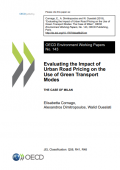Puglia is the leading region in Italy in renewable energy production. Renewable energy deployment in rural Puglia has contributed to rural development, though not on the scale anticipated, and not without generating distortions in the rural economy. Puglia offers a good example of how small-scale power projects can add to local employment. There are multiple projects and in a rural area, even a modest increase in the number of jobs leads to a meaningful percentage increase in overall employment. Small-scale power also seems to offer more opportunities for employment in related industries, such as service providers and manufacturing.
This report proposes four main findings: i) Puglia’s government has been able to learn by doing. Regional policy has been fine-tuned several times to reduce any negative impacts on rural economies. ii) It is very hard for a regional policy to promote local supply chains in wind or photovoltaic energy in the face of international competition. iii) To harmonise the three drivers underpinning renewable energy policy, the regional strategy should be designed to deal with a high degree of complexity and avoid attempts to find shortcuts (such as focusing on a single technology). iv) The potential to develop biomass supply chains remains untapped due to the large number of local actors involved (high transaction costs) and the level of co-ordination among different sectoral policies required.



